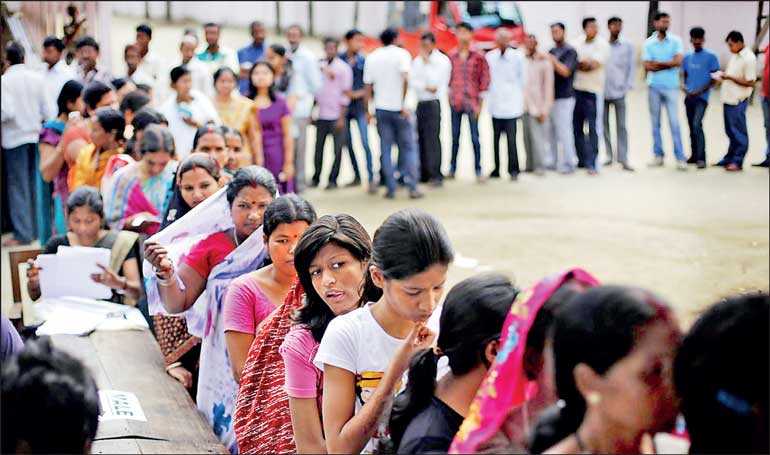Saturday Feb 07, 2026
Saturday Feb 07, 2026
Tuesday, 15 January 2019 00:03 - - {{hitsCtrl.values.hits}}

After shouldering the leadership of global democracy for over seven decades, the United States is seen withdrawing from the rest of the world. The European Union is not as united as it once was with Brexit and far right movements getting more likely to take over some of its member states. Britain and France do not have the clout to assert themselves on the world stage without American backing.
The world is witnessing the end of Western leadership of democracy. This leaves a leadership vacuum. As the largest democracy in the world, leadership should naturally and rightfully go to India next.
From the West to the East
The United States has been the leader of the Free World for over seven decades but the election of Donald Trump has seen an America which has put America First over allies and its principles in many cases. America has been a hope for human rights activists and democracy advocates around the world. Today, we see an America withdrawing from its leadership role over the world.
Other Western countries like Britain and France are too weak to take on the mantle of global leadership without the backing of the United States. The European Union would have been an alternative but it does not have a centralised enough leadership to pursue a foreign policy. With Brexit, it is showing signs of division within and if other countries follow Britain’s path, we could see a breakup of the EU. Also, with far right movements getting stronger in Europe, the EU is getting weakened from within.
This leaves a leadership vacuum to lead global democracy. As the largest democracy in the world and an economy set to become the largest in the long term, India is positioned as the rightful candidate to replace Western leadership.
Democracy in India
India puts a lot of effort on its elections. The last general elections in 2014 were held in over 900,000 polling stations with over a million Government servants and over five million civilian employees working for over a week to conduct the largest elections in the world. In 2019, nearly 900 million people are eligible to vote. This is nearly four times the number of voters in the United States. The sheer scale of elections in India is huge.

When compared to both its neighbours to the East and West, India has remained democratic for seven decades. The Indian Army has remained neutral and stayed out of politics.
India has had a fair and independent elections process, an independent judiciary, a largely free media and a vibrant parliament where opposition parties are able to question the Government. The independent think tank, Freedom House continues to rank India as one of Asia’s freer nations. Though, India’s democracy has its flaws like other democracies have around the world, India’s constitution can be a model for many countries around the world.
Why should India take over?
As the largest democracy in the world, India has a moral responsibility to take over and be a global guardian of democracy. With the withdrawal of American leadership, India has an even greater responsibility. Being a leader in advocating democracy can help India gain influence around the world. This can also help India win over many allies around the world.
China has already claimed the leadership title of globalisation after America’s trade wars. India can position and brand itself as the leader of democracy. India’s membership of Quad shows India’s natural allies are other democracies. Being an advocate for democracy makes a country popular. A Pew Global Research study took a median from 25 countries surveyed and it shows 63% prefer a world led by the United States of America and only 19% prefer a world led by China. Only Russia, Tunisia and Argentina had less than one third preferring American leadership. America wins hands down in a competition with China over world leadership when asked by the rest of the world and it is linked to America’s ideology and principles.
India taking leadership in democracy can not only make India more popular than its rivals globally but also attract global investors. The World Economic Forum’s survey taken from its business elite shows that global investors are concerned about the rise of autocracy around the world. India speaking up for democracy can easily win over investors towards India as global investors prefer democracy in the countries they invest in.
Some Indians argue that India has had a policy of nonalignment, was a former colony of Britain and its economy is not big enough. Well, America too used to have a policy of isolation. America also used to be a colony of Britain and the American economy too was small when the Europeans were ruling the world before the dawn of the 20th century.
India: The next leader of global democracy
India is projected to become a massive consumer market for many countries around the world. With a population of over 1.3 billion people, trading with India can be irresistible to other nations. This can allow India to use this as soft power to promote democracy by allowing access to its consumer base with conditions. The EU uses schemes such as GSP+, where countries meeting EU requirements are given concessions and access to the lucrative EU consumer market.
Leadership of the free world does not come without a price. The United States, as leader of the free world has had to cut off ties, sanction and even go to war with countries to uphold principles.
As the Pew Global Research study shows America is still the most popular country in the world, even in countries where America is considered an enemy by the governments of those countries. Assuming leadership of democracy will make India unpopular among dictators around the world but will win India the hearts of people around the world.